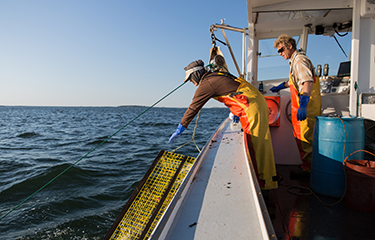On Friday, 24 April, as U.S. President Donald Trump signed an extension of small business COVID-19 relief programs into law, a national group of independent fishermen set aside the day to make sure they and their colleagues had access to the programs designed to keep small businesses afloat during the pandemic.
It comes a day after the Maine Coast Fishermen’s Association and others held a webinar for fishermen and crew members on the packages available to them.
The Fishing Communities Coalition called Friday a “Day of Action” for those individuals they say missed out on federal relief programs. Organizations within the coalition will have experts available to their members to help them apply for COVID-19 aid.
“Fishermen have been hit hard by the COVID-19 closure of restaurants and fish markets, but because many are fishing – albeit for substantially lower prices – they have not yet applied for CARES Act assistance,” said Linda Behnken, the executive director of the Alaska Longline Fishermen’s Association, in a statement. “The time to apply is now. FCC member groups and volunteers are standing by to assist.”
On Friday, the Paycheck Protection Program (PPP) received more than USD 300 billion (EUR 277 billion) in additional funding for small businesses and the Economic Injury Disaster Loan (EIDL) program received another USD 50 billion (EUR 46 billion).
The PPP initiative is a forgivable loan program designed for businesses with less than 500 employees to help them keep workers on the payroll. Independent contract workers are also eligible for the funding, but during the first round of PPP loans, federal regulations forced them to wait a week after businesses started filing to apply for funding.
PPP loans are capped at 10 weeks of payroll funding. While no loan can exceed USD 10 million (EUR 9.2 million), the average approved amount is far less than that.
That round of loan funding, which totaled USD 349 billion (EUR 323 billion), was exhausted in less than two weeks.
“Fishermen were left behind in the first round of funding,” said Ben Martens, executive director of the Maine Coast Fishermen's Association in the release. “Most couldn’t even apply for the first week, so we want to do everything we can to lower the barriers for community-based fishermen to participate in the opportunities that the CARES Act is providing. We are incredibly thankful for our volunteers who are able to lend a helping hand through this time of crisis.”
Banking industry leaders fear the new round of PPP loan funding will evaporate in a matter of days. Last Saturday 18 April, Consumer Bankers Association President and CEO Richard Hunt tweeted that demand for the PPP loans totaled a minimum of USD 1 trillion.
EIDL loans, which help cover six months of operational expenses, are capped at USD 2 million (EUR 1.8 million) per applicant. Those loans aren’t forgivable. However, applicants can also receive a forgivable cash advance of USD 1,000 (EUR 926) per employee up to 10 workers. The cash advance is available to applicants even if they’re not approved for an EIDL loan.
Assistance for those belonging to FCC organizations can be found at the following: Alaska Longline Fishermen’s Association: COVID-19 Fishermen Resources and Assistance; Alaska Marine Conservation Council: COVID-19 Resources for Fishermen; Cape Cod Commercial Fishermen’s Alliance: COVID-19 Fishermen Resources and Information; Gulf of Mexico Reef Fish Shareholders’ Alliance: Information Regarding COVID-19 Response and Assistance; and Maine Coast Fishermen’s Association: COVID-19 Pandemic Resources.
“Much like farmers and ranchers, commercial fishermen help feed America,” said Eric Brazer, deputy director of the Gulf of Mexico Reef Fish Shareholders’ Alliance. “Now, perhaps more than ever, commercial fishermen need a lifeline to help get them through this global crisis and back to work. CARES Act funds are a critical piece and the FCC is doing everything it can to make sure that commercial fishermen aren’t forgotten.”
The coalition isn’t the only resource available for fishermen and seafood companies seeking COVID-19 aid. Saving Seafood is working with a number of port authorities, businesses and other key stakeholders to provide a portal with information about such issues as financial programs, worker visas and disaster declarations that’s updated as new information becomes available.
“We immediately upon the declaration of the national emergency, reached out and heard from about 150 organizations and companies who communicated their concerns,” Saving Seafood Executive Director Bob Vanasse told SeafoodSource on Friday. He noted those issued helped develop the portal sections.
In addition, Vanasse added that his group is working with Congressional and White House officials to convey seafood industry concerns. That includes working on ways for fishing vessel owners to apply for PPP funding when the workers aboard the boats are independent contractors.
Photo courtesy of Maine Lobster Marketing Collaborative







